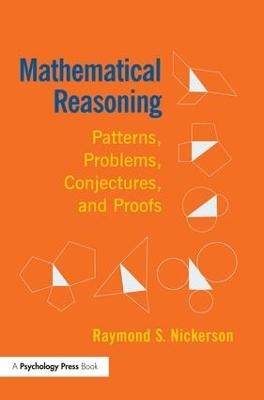
Mathematical Reasoning
Psychology Press Ltd (Verlag)
978-1-138-98058-7 (ISBN)
The development of mathematical competence -- both by humans as a species over millennia and by individuals over their lifetimes -- is a fascinating aspect of human cognition.
This book explores when and why the rudiments of mathematical capability first appeared among human beings, what its fundamental concepts are, and how and why it has grown into the richly branching complex of specialties that it is today. It discusses whether the ‘truths’ of mathematics are discoveries or inventions, and what prompts the emergence of concepts that appear to be descriptive of nothing in human experience. Also covered is the role of esthetics in mathematics: What exactly are mathematicians seeing when they describe a mathematical entity as ‘beautiful’? There is discussion of whether mathematical disability is distinguishable from a general cognitive deficit and whether the potential for mathematical reasoning is best developed through instruction.
This volume is unique in the vast range of psychological questions it covers, as revealed in the work habits and products of numerous mathematicians. It provides fascinating reading for researchers and students with an interest in cognition in general and mathematical cognition in particular. Instructors of mathematics will also find the book’s insights illuminating.
Raymond S. Nickerson, retired senior vice president of Bolt Beranek and Newman Inc. and research professor at Tufts University, is a fellow of the American Association for the Advancement of Science, the American Psychological Association, the Association for Psychological Science, the Human Factors and Ergonomics Society, and the Society of Experimental Psychologists. He is the founding editor of The Journal of Experimental Psychology: Applied, the founding and series editor of Reviews of Human Factors and Ergonomics, an annual publication of the Human Factors and Ergonomics Society, and the author of several books, including Aspects of Rationality: Reflections on What it Means to be Rational and Whether We Are (Psychology Press, 2008).
1. What Is Mathematics? 2. Counting. 3. Numbers. 4. Deduction and Abstraction. 5. Proofs. 6. Informal Reasoning. 7. Representations. 8. Infinity. 9. Infinitesimals. 10. Predilections. 11. Esthetics in Mathematics. 12. The Usefulness of Mathematics. 13. Foundations. 14. Preschool Development. 15. Math in Schools. 16. Math Problem Solving. 17. Final Thoughts.
| Erscheinungsdatum | 07.03.2022 |
|---|---|
| Zusatzinfo | 15 Tables, black and white; 44 Illustrations, black and white |
| Verlagsort | Hove |
| Sprache | englisch |
| Maße | 152 x 229 mm |
| Gewicht | 453 g |
| Themenwelt | Geisteswissenschaften ► Psychologie ► Allgemeine Psychologie |
| Geisteswissenschaften ► Psychologie ► Verhaltenstherapie | |
| Mathematik / Informatik ► Mathematik | |
| ISBN-10 | 1-138-98058-7 / 1138980587 |
| ISBN-13 | 978-1-138-98058-7 / 9781138980587 |
| Zustand | Neuware |
| Haben Sie eine Frage zum Produkt? |
aus dem Bereich


